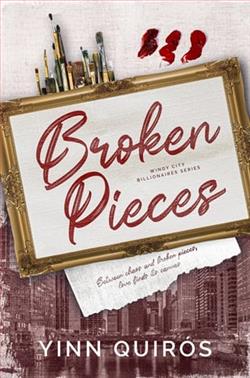Page 60 of Ringer
Turning, she saw Caelum rising from a plastic chair to greet her, trying as hard as he could not to smile, not togrin, and failing totally, so they stood together twenty-five feet apart in a police station in Nashville, Tennessee, at nine p.m. on a Sunday, and laughed.
Turn the page to continue reading Lyra’s story. Click here to read Chapter 8 of Gemma’s story.
NINE
DETECTIVE KEVIN REINHARDT KEPT HIS word and made sure that no charges were filed against Caelum. By the time he announced that Caelum was free to go, it was nearly midnight, and Lyra had fallen asleep in one of the plastic chairs in the waiting room with her head on Caelum’s shoulder, directly beneath a large framed poster of the singer named Elvis she had originally mistaken for another Dr. Saperstein.
Detective Reinhardt volunteered to drive them back to the Greyhound bus station, although he warned them it was likely the buses to Philadelphia wouldn’t run until morning and that the neighborhood was a bad place to go wandering. Lyra told him they planned to wait inside the station, that they didn’t mind spending the night on the floor.
“You got somewhere to stay once you get up to Philly?”he asked them, once they arrived at the station. “You got friends up there? People you know?”
“Oh, sure,” Lyra said. “Lots of people. It’ll be just like home to us.”
It wasn’t exactly a lie. Lyra had told Caelum that they would find God there, at a place called UPenn.
It was a slim hope—Dr. Saperstein might simply put them in a cage, as he had done back in Haven—but their only one. He had filled Lyra with sickness. He might, she thought, be able to remove it.
“You need help or run into trouble, you just give me a call,” he said, and gave her a small white card with his name printed on it, and more numbers she now knew must connect to his telephone. “I want you to study that number. Memorize it, okay? Promise me.”
Lyra nodded, overwhelmed. Other than Gemma, Detective Reinhardt was the first person to give her a number, his number, to call. She felt, holding the card, as if she were holding something fragile, something sacred and beautiful.
She blinked to clear her eyes of tears and watched the numbers sharpen and flow into a pattern, make a sentence in her mind. “I promise,” she said.
Climbing out of the car, however, she felt a strong pull of dread. She thought again of Jake Witz; of finding him swinging from a doorjamb, his face swollen anddiscolored, and the cleanup crew who’d come afterward to make sure that no one would ask questions. He, too, had offered help. Rick had helped, and she was sure that by now the people who’d taken him in their car had murdered him.
She hoped this man, Detective Kevin Reinhardt, wouldn’t end up hanging from a rope.
It was by then after midnight, and no buses would run for hours. Several people lumped on the benches to sleep might have been distant rock formations. It was quiet, and still, except for an old man pacing and muttering darkly to himself.
She wanted to ask Caelum why he had gone off without her, but she was worried about what his answer would be. Besides, she felt sick again. A seesaw was starting in the bottom of her stomach, back and forth, back and forth, slowly tossing acid up in the back of her throat.
They went in search of ginger ale: the vending machine at the station was out of everything but Coke. At Haven, she had had ginger ale regularly, because along with the antinausea drugs that got delivered orally or piped in through an IV, the nurses distributed warm ginger ale in small paper cups. The taste of ginger ale reminded her in equal measure of Dr. O’Donnell and of the Box, and so she loved and hated it, also in equal measure.
Nothing was open this late. They kept walking. Lyra’slegs felt strange and sticky, as if they were made of metal that had rusted. She was exhausted. Her relief at being reunited with Caelum only made her aware of how lost she would have been without him; it wasn’t, therefore, exactly relief. Though Detective Reinhardt had said it was a bad place to walk, she felt that with Caelum next to her, nothing bad could ever happen again. But several blocks from the bus station, Lyra became aware of a change in the shadows around them, a subtle rearrangement of the nighttime noise of that foreign city.
They were being followed. They’d been herded, actually. Unconsciously trying to outpace the voices even before they knew what the voices meant, they had wound up on a narrow one-way street that contained nothing but a shuttered auto-parts supply store and a vacant warehouse.
Before Lyra had a chance to warn Caelum, they were surrounded. Five men, not much older than Caelum was, and one girl who hung back, keeping her eyes on her phone. The light from the screen made strange shadows on her face.
The five boys tossed Lyra’s backpack and took the wallet Gemma had given Lyra, which held Gemma’s bank cards and all of her money. But what really made Lyra angry was the way they scattered her stuff: the bottle caps and old plastic bags filled with clinging browning plantmatter and coins and a rusted pin shaped like an apple, all the things she’d collected and cared for at Winston-Able.
“You a trash lady or something?” one of them said, and hurled away a pen, her favorite pen, its end deformed by chewing.
They made fun of Caelum for the knife he carried—“You need more than a pair of tweezers, you swag around here like we’re supposed to know you”—and insisted he hand over his money (stolen, Lyra knew, from the cash box at work) and even his belt, which one of the boys wanted. Caelum did what they said without a word. Still, Lyra could feel anger like heat ticking off him, subtle waves of it that made her light-headed.
When one of the guys moved to touch Lyra’s cheek, Caelum began to growl. At first the boys thought this was funny, and they laughed.
“Look at this guy. He’s like a cat or something.” A second guy stepped forward and tried to push Caelum.
Quickly, even as a passing car threw light briefly onto the brick wall behind them and then darkness crowded in after it, Caelum changed. He was a person and then he was something less, something animal and old. He lunged, snapping his teeth.
The guy wrenched his wrist away, finally. “Freaks,” he said. Though Caelum and Lyra were drastically outnumbered, the power had shifted. “Freaks,” he said again, andwhen he met Lyra’s eyes, he looked afraid. “Come on. Let’s get the fuck out of here.”
After they were gone, Lyra bent to retrieve her scattered belongings. But she couldn’t distinguish her things, her special things, from the trash in the gutter, little knobby strangers that meant nothing to her—snub-nosed cigarette butts, tongues of gum stuck to their wrappers.
“Are you all right?” Caelum asked her. It was practically the first thing he had said to her directly since they’d laughed together like idiots in the police station.
She didn’t answer him. She was nauseous, and tired, and they had nowhere to sleep, and no money to buy a bus ticket, either. She hated the group of boys who’d followed them and laughingly upended her backpack to shake her things into the gutter. She hated the girl who stood there with her eyes stuck to her phone screen, the girl who couldn’t even be bothered to look. How could they be people the same way that Detective Reinhardt and Gemma and her friend April were people? The difference between people and replicas was one of ownership. Real people owned, and they took, and replicaswereowned. A difference of action and object.















